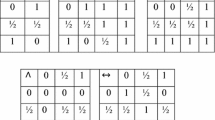Abstract
Formal axiomatic theories based on the three-valued logic of Lukasiewicz are considered. Main notions related to these theories, in particular, those of Luk-model, Luk-consistent theory, and Luk-complete theory are introduced. Logical calculuses that describe such theories are defined; counterparts of the classical compactness and completeness theorems are proved. Theories of arithmetic based on Lukasiewicz’s logic and on its constructive (intuitionistic) variant are investigated; the theorem on effective Luk-incompleteness is proved for a large class of arithmetic systems. This theorem is a three-valued counterpart of the famous Godel theorem on incompleteness of formal theories. Three-valued counterparts of Presburger’s arithmetic system are defined and proved to be Luk-complete but incomplete in the classical sense. Bibliography: 29 titles.
Similar content being viewed by others
REFERENCES
L. Bolc and P. Borowik, Many-Valued Logics 1: Theoretical Foundations, Springer-Verlag (1992).
H. Bolibekyan, “The compactness theorem in many-valued logics,” Preprint of IIAP of ANAS and YSU, No. 02-001 (2002).
K. Godel, “Die Vollstandigkeit der Axiome des logischen Funktionenkalkuls,” Monatsh. Math. Phys., 37, 349–360 (1930).
K. Godel, “Uber formal unentscheidbare Satze der Principia mathematica und verwandter Systeme,” Monatsh. Math. Phys., 38, 173–198 (1931).
R. Haenle and G. Escalada-Imaz, “Deduction in many-valued logics: a survey,” Marthware Soft Computing, IV, No.2, 69–97 (1997).
D. Hilbert and P. Bernays, Grundlagen der Mathematik, 1, Springer-Verlag, Berlin (1934).
S. C. Kleene, Introduction to Metamathematics, Amsterdam-Groningen (1952).
C. I. Lewis and C. H. Langford, Symbolic Logic, New York-London (1932).
J. Lukasiewicz, “O logice trojwartosciowej,” Ruch Filozof. (Lwow), 5, 168–171 (1920).
A. I. Mal’cev, “Untersuchungen aus der Gebiete der mathematischen Logik,” Mat. Sborn., 1, No.43, 323–326 (1936).
M. Presburger, “Uber die Vollstaendigkeit eines gewissen System der Arithmetik ganzer Zahlen, in welchem die Addition als einzige Operation hervortritt,” in: Sprawozdanie z Kongresu Matematikow Krajow Slowianskich (Comptes rendu du I congres des mathematiciens des pays slaves), Warszawa (1930), pp. 92–101.
N. Resher, Many-Valued Logic, McGraw-Hill, New York (1969).
J. B. Rosser, “Extensions of some theorems of Godel and Church,” J. Symb. Logic, 1, 87–91 (1936).
J. B. Rosser and A. R. Turquette, Many-Valued Logics. Studies in Logic and the Foundations of Mathematics, North-Holland, Amsterdam (1952).
J. Rousseau, “Sequents in many-valued logics. I,” Fund. Mat., 67, No.1, 23–33 (1967).
J. Rousseau, “Sequents in many-valued logics. II,” Fund. Mat., 70, No.1, 125–131 (1970).
I. D. Zaslavsky, “On the predicate and arithmetic calculuses of the symmetric constructive logic,” Sov. Math. Dokl., 14, 751–754 (1973).
I. D. Zaslavsky, Symmetric Constructive Logic [in Russian], Acad. Sci. Arm. SSR (1978).
I. D. Zaslavsky, “On the symmetric constructive truth of arithmetic formulas,” in: 7th All-Union Conference on Mathematical Logic, Abstracts of Reports, Novosibirsk (1984), p. 67.
I. D. Zaslavsky, “Symmetric constructive logic and some of its applications,” Doctoral Thesis, Yerevan (1987).
I. D. Zaslavsky, “On the symmetric constructive arithmetic,” in: 9th All-Union Conference on Mathematical Logic, Abstracts of Reports, Leningrad (1988), p. 59.
I. D. Zaslavsky, “On biconstructive arithmetic formulas,” in: 10th All-Union Conference on Mathematical Logic, Abstracts of Reports, Alma-Ata (1990), p. 67.
I. D. Zaslavsky, “On iterations of determining algorithms of the symmetric constructive logic,” in: 11th Interrepublican Conference on Mathematical Logic, Abstracts of Reports, Kazan (1992), p. 62.
I. D. Zaslavsky, “On the theory of constructive reducibility,” in: Proceedings of the International Conference on Computer Science and Information Technologies (CSIT’97), Yerevan (1997), pp. 10–11.
I. D. Zaslavsky, “On a logically but not functionally complete calculus in three-valued logic,” in: The Tbilisi Symposium on Logic, Language and Computation, Selected Papers, CSLI Publications, Stanford, California (1998), pp. 309–313.
I. D. Zaslavsky, “On three-valued arithmetic,” in: Proceedings of the International Conference on Computer Science and Information Technologies (CSIT’01), Yerevan (2001), pp. 133–136.
I. D. Zaslavsky, “Dual realizability in symmetric logic,” Ann. Pure Appl. Logic, 113, 389–397 (2002).
I. D. Zaslavsky “On three-valued logical models and their applications to arithmetical theories,” Denis Richard 60th Birthday Conference, Clermont-Ferrand, France (2002) [submitted].
I. D. Zaslavsky “On the completeness properties of the systems of symmetric constructive and three-valued logic,” in: International Conference “21st Days of Weak Arithmetics,” Abstracts, St. Petersburg (2002), pp. 17–18.
Author information
Authors and Affiliations
Additional information
__________
Published in Zapiski Nauchnykh Seminarov POMI, Vol. 304, 2002, pp. 19–74.
Rights and permissions
About this article
Cite this article
Zaslavsky, I.D. Formal Axiomatic Theories Based on a Three-Valued Logic. J Math Sci 130, 4578–4597 (2005). https://doi.org/10.1007/s10958-005-0353-2
Received:
Issue Date:
DOI: https://doi.org/10.1007/s10958-005-0353-2




